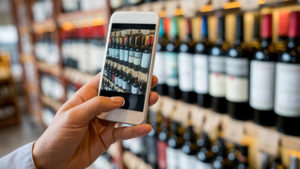
As one of the most heavily regulated categories, the spirits business has long been defined by mandated category norms and a reliance on traditional points of sale. However, as technology evolves and eCommerce reinvents retail, this disruption is starting to be felt by the spirits market as well.
While spirit consumption has been dominated by on-premise consumption, eCommerce offers a significant new revenue stream to spirit brands in the form of at-home purchasing and upends the consumer purchase journey. Brands globally are recognising how eCommerce could help unlock the off-premise opportunity, progressing a very tangible transformation from offline to online in the alcohol industry which has led to online alcohol sales rising by a healthy 32.7% last year according to Slice Intelligence.
In 2018 we scarcely had a conversation about eCommerce without speaking about Amazon. In 2015, Amazon rolled out Prime Now alcohol delivery in selected cities across the US and Europe. With the click of a button via the Amazon app, Prime members have access to 2-hour free delivery, or $7.99 for one-hour delivery of alcohol. In many markets, Amazon is pioneering in the alcohol delivery space. In Germany, Amazon is plugging a gap for online alcohol sales, already commanding a 50% market share where competition from other business is scarce per research from the IWSR, dominating the market in territories where it’s won first pickings.
Brands such as Hendrick’s are best-in-class examples of ensuring their Amazon presence is fully optimised with a dedicated brand store, and a full inventory to respond to the increasing demand in online alcohol orders. Hendrick’s ensures Amazon best practises are met, with strong A+ Content, hundreds of reviews and high star ratings. Products are all prime eligible, meaning customers can have their order delivered on the same day. Brands can personalise their pages as they desire, translating their native D2C experience onto Amazon.
Legal and logistical constraints surrounding alcohol and delivery means that selling via online, whether it be D2C or via marketplace/ apps is complex. Alcohol merchants have long been hesitant to explore eCommerce, but recent breakthroughs in fulfilment are opening new revenue streams and reshaping brands expectations of online success. Lead by UPS in 2017, businesses using the service ‘UPS Express’ are now able to ship alcohol directly to consumers across international markets.
The relationship between UPS and Clos19 in the US has eased the path to purchase for Clos19 consumers, facilitating a seamless consumer experience from purchase to delivery with rich digital content, international shipping, and an immersive navigation. 41 countries now accept B2C alcohol sales, and businesses like UPS are creating a frictionless, easy path to purchase for spirits brands to reach the consumer with fast, efficient, global delivery.

It’s not only global giants like Amazon and UPS that are reinventing alcohol eCommerce; the start-up alcohol delivery movement is seeing significant venture capitalist investment, supporting the growth of the category. As mobile becomes our screen of choice, beverage delivery apps have proliferated facilitating quick delivery via apps in the click of a button. The ‘Deliverooification’ of the spirit’s market is being fuelled by start-ups finding ways of circumventing the red tape with innovations and partnerships in fulfilment.
‘Bevy Butler’ in the UK for example promises delivery of alcohol in 30-minutes in central London by tapping into a network of corner shops and off-licenses rather than large out of town warehouses. The business offers better prices than rival alcohol delivery services by doing so, and at a faster delivery time. Apps such as this are pushing the off-premise consumption of alcohol and spurring a huge growth within the alcohol eCommerce market.
The changing landscape and rise of mobile provide a big opportunity for spirit brands. Ecommerce drives growth where bricks and mortar has limitations, and now category limitations are being overcome by fulfilment and delivery advances, alcohol eCommerce is freed up to wider opportunities too. In having a holistic approach to retail, brands can move with evolving consumer behaviours and respond to a changing purchase journey.
The influx of start-ups within the online alcohol industry is a credit to the increasing popularisation of off-site, at home drinking at the click of a button. New and established spirits businesses alike would be foolish not to drink up a growth opportunity like this.
Article by Mudit Jaju, Global Head of eCommerce and Lily O’Keefe, eCommerce Executive, Wavemaker.

About Mudit and Lily:
Mudit Jaju is responsible for building out Wavemaker’s eCommerce practice globally, while Lily O’Keefe is part of the team based in London, working with multi-market clients looking to establish and execute on eCommerce strategies with a focus on brand representation on eCommerce platforms.
Source: Wavemaker

You must be logged in to post a comment Login